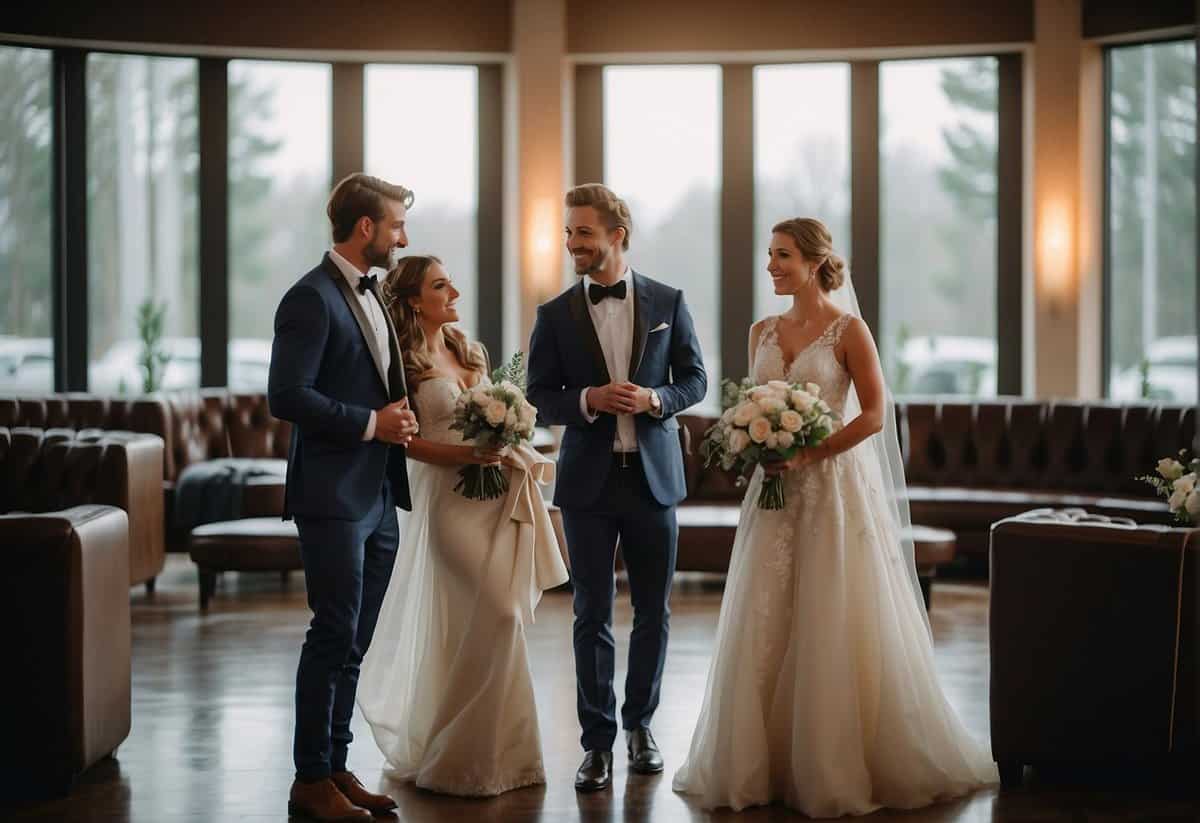Can You Haggle Wedding Venues? Tips for Negotiating Your Big Day’s Price
When planning your wedding, one of the most significant expenses you’ll encounter is the venue. It’s where you’ll celebrate your special day, and its cost takes a considerable portion of your budget. Understanding that weddings are complex events involving many different elements, the venue isn’t merely a location but a comprehensive package that often includes catering, staff, and amenities. With such a substantial investment at stake, it’s natural to wonder whether there’s room to negotiate the terms and pricing to better fit your financial plan.

Tackling the negotiation process with your wedding venue requires a blend of tact and knowledge. While wedding venues are generally in high demand, especially during peak seasons, there are ways to approach this discussion to find a balance between what you desire for your day and what is financially feasible. Moreover, by coming to the table informed and flexible, you can communicate effectively with venue representatives to potentially adjust costs or package details, ensuring both parties are satisfied with the agreement.
Key Takeaways
- The cost of a venue is a substantial part of the wedding budget and can often be negotiated.
- Effective negotiation requires a mix of preparation, understanding of venue pricing, and clear communication.
- Confirming negotiated terms in writing is crucial to finalize the agreement with your wedding venue.
Understanding Wedding Venue Pricing

When planning your special day, understanding the cost structure of wedding venues is crucial for staying within your budget. It’s essential to know what drives the pricing to effectively negotiate and make informed decisions.
Market Research and Price Understanding
Before you contact venues or consider signing a contract, do your research. Familiarizing yourself with the market rates in your desired location is a foundational step. By studying the average cost of venues, you give yourself a strong position from which to negotiate. Prices can vary widely depending on various factors like location, popularity, and amenities. This knowledge is instrumental in setting a realistic budget.
The Cost of Wedding Essentials
On your wedding day, the wedding essentials—venue, catering, and alcohol—typically consume a significant portion of the budget. Catering expenses can be especially hefty and are sometimes based on a minimum number of guests. The venue might package these services, so you’ll need to understand what’s included, like tables, chairs, and linens. Don’t forget to account for potential extras, such as audio equipment or lighting.
Factors Influencing Venue Costs
Several aspects can influence the cost of your dream venue, and it’s important to recognize these to find the best deal. Booking during off-peak times can lead to discounts. The wedding date and day of the week also play a role; weekdays are often cheaper than weekends. Moreover, the size of your guest list affects pricing, as venues charge based on the number of attendees. Keep in mind that the aesthetics of a venue might reduce or increase your décor and dress budget—another reason why it’s important to view the venue’s pricing within the larger context of your wedding essentials.
Strategies for Negotiating with Venues

Navigating through venue negotiation can be intricate, yet with a strategic approach, you can haggle to ensure your service needs are met within your budget. Stay confident throughout the process and be prepared to haggle with precision, using every opportunity from parking options to menu flexibility to secure the best deal.
Starting the Negotiation
Initiate the negotiation for your wedding venue with clear objectives and confidence. Have an understanding of the venue’s offerings and standard rates before you start. It is essential to express your vision and budget constraints politely yet firmly. Remember to:
- Start low, giving yourself room to maneuver.
- Ask with confidence, as vendors are often open to negotiation.
Utilize knowledge of peak and off-peak seasons to your advantage. For instance, venues may offer more attractive rates during less busy times. When approaching a venue, ensure you’re equipped with competitor pricing to create a baseline for discussion.
Discussion Points and Extras
Focus on the specific amenities that hold most value to you, such as exclusive parking arrangements, quality of bathrooms, or setup capabilities. When discussing, consider the following:
- Itemize what’s included and use a list to keep track of services discussed.
- Explore package extras and clarify any ambiguous points, like catering services or how the menu might be customized.
Remember, it’s not just about the cost—it’s about getting what is meaningful for your special day. Always inquire about what additional services or items can be included at little to no extra charge.
Negotiating Add-Ons and Discounts
Your negotiation skills can lead to added value or substantial discounts. While discussing potential add-ons, bear in mind:
- Liquor: Can a BYOB policy cut costs, or is there room to negotiate on alcohol packages?
- Catering: Is there wiggle room within the catering services, like customizing the menu for better pricing?
Always aim for written confirmation for all agreed-upon services and discounts. Being assertive in requesting discounts on upfront payments or off-season bookings can result in significant savings.
Through strategic negotiation, you can enhance your wedding experience while remaining prudent with your finances.
Finalizing the Deal

When you’re at the point of finalizing the deal for your wedding venue, it’s crucial to understand the nuances of payment terms and the importance of thoroughly reviewing contracts. At this stage, you’ve likely navigated through negotiation successfully, and it’s time to ensure everything is set in stone to avoid any unexpected surprises down the line.
Payment Terms and Schedules
Your payment plan is the backbone of your agreement, so it’s essential to get it right. Ensure that you are clear on the payment schedule, including when deposits and subsequent payments are due. A typical schedule might include:
- Initial Deposit: Often a fixed percentage of the total cost, required to secure your date.
- Progress Payments: Regular payments that might be tied to specific planning milestones.
- Final Payment: Generally due a few weeks before the wedding day, make sure to account for tax and gratuity if they are not included in the initial quote.
Remember that there may be wiggle room to adjust payment terms, especially if your budget is tight. Some venues might agree to a reduced service package or allow for extras to be removed to lower costs.
Contracts and Vendor Policies
Understanding the terms of your venue contract is critical. When reviewing the contract, look for clauses related to:
- Approved Vendors: Some venues require you to use their approved vendors for services like catering and equipment rental.
- Service Specifications: Details about what is included in the venue fee, from logistics support to the specifics of what rental items are provided, should be clear.
- Gratuity and Extras: Confirm if gratuity is included or if you’ll need to allocate an additional amount. Also, understand the costs of any potential extras you might want.
Carefully check the cancellation and refund policies, especially regarding the deposit and payments made if changes are needed. And always, make sure to get everything in writing. Consider consulting with wedding planners who often have experience in these areas and can ensure you’re not overlooking any details.
Frequently Asked Questions

When planning your big day, it’s natural to want to maximize your budget. Negotiating with venues and vendors can offer potential savings, letting you allocate funds to other parts of your celebration. Let’s look at some common queries around haggling in the wedding industry.
How can I negotiate with wedding venues to lower the cost?
To negotiate with wedding venues, be transparent about your budget constraints from the start. Approach the conversation with flexibility, suggesting dates that are off-peak or considering package adjustments that could reduce overall costs. Explore various questions to ask wedding venues that could lead to savings.
What strategies are effective when haggling with a wedding venue?
Effective strategies include doing thorough research on average costs, being polite yet assertive, and offering to pay in full for a potential discount. Discuss options like scaling back on certain services or customization for cost reduction. Familiarize yourself with a comprehensive list of questions to ask to fully understand what can be negotiated.
Is it possible to negotiate pricing with wedding planners?
Yes, it is possible to negotiate with wedding planners. Discuss your budget openly and ask if they can tailor their services to fit your financial plan. They may offer alternative solutions or recommend cost-effective vendors that can help in keeping your expenses in check.
How can I discuss budget-friendly options with hotel event coordinators for my wedding?
Begin by expressing your vision and budget limits to the hotel event coordinator. Request a breakdown of costs and see if there are less expensive packages available, or if certain elements of the package can be altered or removed to decrease the price.
Are wedding vendors typically open to price negotiation for services?
Many wedding vendors are open to negotiations, especially if you’re booking multiple services or opting for a longer-term engagement. Inquire about any special deals or discount that could be available if certain conditions are met, like referring other clients or choosing a less popular date.
What tips can help me when negotiating with wedding caterers to fit my budget?
Be upfront with wedding caterers about your budget and guest count. Consider asking if they can customize a menu to fit your budget or if they offer discounts for larger guest numbers. Probing important questions can unearth areas where caterers might be willing to work with you on cost.


